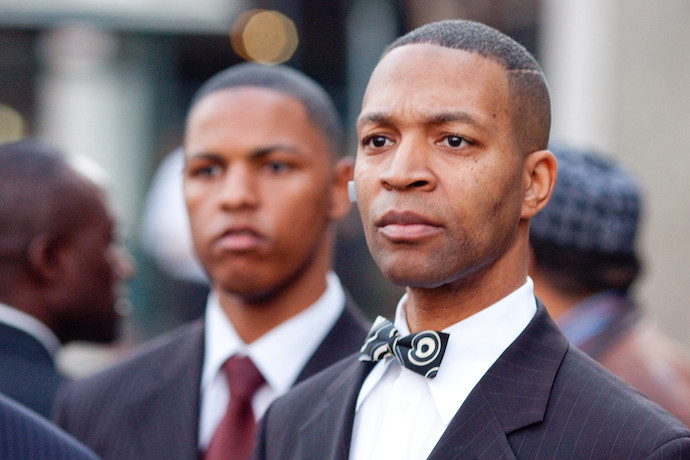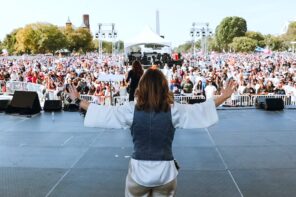Here’s a quick quiz. Guess who wrote the following words:
“Indeed I tremble for my country when I reflect that God is just: That his justice cannot sleep for ever: that considering numbers, nature and natural means only, a revolution of the wheel of fortune, an exchange of situation, is among possible events: that it may become probable by supernatural interference!”
Was it Minister Louis Farrakhan? Rev. Jeremiah Wright? Some other Black liberation theologian? No, no, and no. These words were penned by Thomas Jefferson, author of the Declaration of Independence and third President of the United States.
In Notes on the State of Virginia, Jefferson pondered the threat that a slaveholding nation faced by holding others in bondage. Jefferson’s words seemed prophetic three years later when the slaveholding French colony of St. Domingue was overthrown by enslaved Africans in what would come to be known as the Haitian Revolution.
From the Founders of the Republic like Jefferson, to current-day senators like Ron Johnson who confessed that had it been Black Lives Matters protestors who’d stormed the Capitol on January 6th, then he would have been worried, the fear of retribution by its Black citizens for past wrongs has long fueled attempts to keep African Americans subservient. Even more frightening is the thought that a Black uprising may have divine sanction—or at least the idea that Black folks believe their cause is just since God demands justice.
This brings us to a recent New York Times article with the curious headline “Suspect in Capitol attack appears to have been a follower of Louis Farrakhan,” whose writers intimate that the suspect in the April 2nd attack that killed a veteran Capitol police officer was motivated by the leader of the Nation of Islam, Minister Louis Farrakhan. The suspect, Joshua Green, described himself on social media as a “follower of Farrakhan” and encouraged others to do so as well in the lead up to the assault.
While it may be seen as good investigative reporting to look through the social media accounts of suspects accused of terroristic violence to find a “smoking gun” of radicalism, more often than not a hurried and incomplete picture is presented to the public while any subsequent stories about motives receive far less attention or are ignored. Given that Green clearly hints at his own instability why is this fact deemphasized in favor of his connection to the Nation of Islam?
By concentrating on the eschatological reckoning taught by the Nation of Islam, the media perpetuates the constant and flawed comparison between right-wing Christian nationalism and Black religious nationalism. As a rule, Black religious nationalist groups do not view armed struggle or conflict as a method to ameliorate the racial situation in America. On the contrary, in E.U. Essien-Udom’s classic text on the Nation of Islam, Black Nationalism: A Search For An Identity in America, a tenet of the group is to follow the laws of the land because enslavement is part of a divine plan.
In a recent biography on Malcolm X, The Dead are Arising by Les and Tamara Payne, the authors note most violence carried out by members of the NOI is within the context of intragroup skirmishes that took the life of Malcolm X or between opposing African-American Islamic sects such as the Hanafi massacre of 1973. Neither of these qualifies as a call for violent revolution against the U.S. government.
Another example to consider is the resulting opinion of the Clay v. U.S. decision which overturned the decision of the draft board and appeals courts which had rejected his conscientious objector status as a minister of the Nation of Islam. It was only after Justice Harlan read Nation of Islam religious literature prior to crafting a majority opinion upholding his conviction that he and others understood the religious worldview of the petitioner and the religious organization he belonged to. Ali, like other members of the NOI, would only take up arms if God Himself led the charge (a highly unlikely occurrence). What this amounted to was a rhetorical admission that the NOI would not engage in armed conflict, period.
While it’s quite convenient to take shortcuts by relying on the opinion of the Southern Poverty Law Center to explain the beliefs of African-American religious groups, it often relies on a flawed and completely problematic interpretation of African-American religions that do not place an integrationist ethos at the center of their worldview. Because these groups employ racial mythologies that condemn the racism that forms the cultural matrix of their lived experience. The media, anti-hate organizations, and even the intelligence community exaggerate the apocalyptic and eschatological rhetoric to create an analogue to white Christian nationalist rhetoric, and more importantly violence. The routine declaration that God will rain down justice on America for its mistreatment of Black people is a consistent and often-feared element of Black religiosity, however it’s far from unique or even un-American.
It is, in fact, quite an American tradition to warn the wayward masses of the sins of the moment. This tradition, the jeremiad, named for the biblical prophet Jeremiah, is discussed at length by Harvard scholar Sacvan Bercovitch in his monumental text American Jeremiad. From John Winthrop’s Dreams of a City on a Hill (1630), American Christians have proclaimed that America should be a beacon to the nations. They have also lamented the frivolity, drunkenness, and sinfulness of the 19th century that culminated in the millennialist visions of a 20th century second-coming along with the temperance movement.
However, this tradition has a darker side as often racial progress has been lumped in with the iniquities of secularism by evangelical Christians. After the social revolutions of the 1960s, evangelical Christians warned against removal of school prayer, and the normalization of homosexuality, women’s rights, New Age religions, and school busing as national sins that would receive God’s wrath if repentance didn’t come soon. In our current day, evangelicals still rail against the “sins” of socialism and secularism.
In David Howard Pitney’s African American Jeremiad: Appeals for Justice in America we see that the tradition of holding America accountable based on both its founding documents and biblical notions of justice have a long tradition in Black religious and political thought. This rhetorical tradition has been employed by individuals as diverse as Frederick Douglass, Maria Stewart, W.E.B Du Bois, Martin Luther King, Jr., Elijah Muhammad and his two proteges Malcolm X and Louis Farrakhan. Each has plumbed the depths of this rhetoric of racial accountability.
While Louis Farrakhan’s history of anti-Semitic statements are fair game, posing him and the Nation of Islam as incubators of anti-government violence is simply not borne out by the religious group’s history. This type of reporting does a disservice to combatting actual extremism and anti-government violence. In addition, the life, service, and memory of Capitol Police Officer William “Billy” F. Evans deserve better treatment than being used as fodder in the right-wing/left-wing extremist debate.





